- Home
- David Guterson
The Country Ahead of Us, the Country Behind Page 2
The Country Ahead of Us, the Country Behind Read online
Page 2
“Don’t be scared,” she said to me. “Please.”
Don had settled into a chair. A shine of tears lay against his pupils.
“Don’t be scared,” Suzette repeated.
She kissed me again, unbuttoning my shirt now. “Relax,” she suggested. “Have a good time.”
I got out of there. I don’t know how, exactly. I only know that when I found myself again I was in one of the landings leaning against an electric icemaker.
“Boo,” Larry said. “Oh, come on! I was sure you were going to get laid there, John.”
I said, “In answer to your question, Cora, that’s the closest I’ve ever come to having sex with a prostitute.”
But when we went up to bed she wouldn’t speak to me or look at me.
“What is it?” I said.
“You,” Cora whispered.
I didn’t know what that meant. So I asked her to explain.
Cora lay on the bed in her nightgown, speaking to the ceiling, to the darkness. “You’re driven by sex,” she said. “Do you know what I mean? Do you know what you’re made of? What made you go up to that motel room anyway? Can you answer without lying to yourself, to us?”
“I was sixteen,” I complained.
“Sixteen,” she answered. “That’s a lie. Sixteen—that doesn’t explain anything.”
“I got out of there, didn’t I? Before anything happened? Didn’t I get out of there?”
“You were young,” she said. “You just said that.”
She pounded the mattress with an open palm, turned away, looked through the bedroom window, where snow hung gently falling against the darkness. “What would you do now?” she asked. “You don’t even have to answer that.”
“I never would have been there in the first place,” I said.
“That’s a lie,” said Cora.
“Why would I lie?”
“Because you always do. And you never admit it. That’s what’s really sleazy.”
She cradled one cheek in the palm of her hand, as though she was reading a book in bed, and stared at the snow beyond the window. Her hair, I remember thinking, was why I had married her—black hair, a lot of it.
“It’s a lie,” she said. “Sixteen—that doesn’t explain anything. I know who you are, John, better than you do. I see it in you all the time, everywhere we go.”
“Cora,” I said. But there was nothing to follow it up with. Because I knew what she was talking about. I knew exactly what it was. I knew the thing inside me she was pointing to.
I lied. I lied to her even though it was Christmas. I didn’t want to tell her about where I’d been and what I’d been, even though somehow she already knew about it. She could feel it; it sprang from me like some bad odor. But it was easier that way, I decided just then—easier to leave it like that than to talk about it, so I lied. It was a perfect opportunity not to, maybe, but I lied because it was easier. I said, “I was young then. It doesn’t have anything to do with me now. I’ve grown up. I’m a different person.”
The next morning the world was a fragile, white place, the branches of the spruce trees loaded down with snow, the wind blowing cold and the sun dazzling, the children opened their gifts, screaming, we went outside and threw snowballs in the yard, ate a pleasant supper, drank buttered rums, it was all a joke, the story forgotten, Christmas usurping everything else.
We made angels in the snow, Cora and myself, swept our arms through the powder, left an impression of wings that would melt before the new year.
What happened? I often ask myself that. There was a chain of things, I guess, long and confused, so that even I can’t unravel it. The last one, we were at somebody’s party. I was in a swimming pool. Kissing a woman in the shallows. We both had our clothes on, mostly. I was too drunk. After that, Cora was gone.
Opening Day
We waited for morning in a sad little motel where you could smell hunters skulking in every direction. I lay listening to vague presences in the next room, strangers playing lonely rounds of five-card draw, until it seemed all right to dispense with the minor pretense of the clock and, gently, wake up my father and son. Pop couldn’t turn himself over or sit upright first thing; he wheezed once and guessed he didn’t want to be spry; everything hurt and it was no use pretending otherwise. But Sean, yawning, made a clean break from his dreams, spun from the bed, wheeled toward the bathroom, and after he had let loose a brash stream of night water, sprawled like a prince on his motel pillows stuffing shells into the pockets of his field jacket. “Come on, Pop,” he said. “Up and at them.”
Pop grunted, blinking, and fished for his glass of teeth, words leaking from the corner of his mouth, sour ire. “You thlow down, Thawn. Take afther your damn dad. Tho damn frithky firth thing like that.”
I shook my head: they were both immoderate. “That was a long time ago,” I reminded Pop. “Besides, any other morning you couldn’t roust Sean out with anything short of TNT.”
Pop fixed his teeth in place. “Not so long,” he said, trying them out, his jaw working them over, the long crevices in his cheeks churning. “Where are we going to get breakfast?”
We drove through a silent and frosted darkness with the sage desert just beyond the pale of the road. Along the strip of autumnal, shameless motels, hunters loaded gear in lots lit by running lights, steam spewing from their mouths. The dogs circling just beyond the tires, the bald fences enclosing vacant guest pools, the last of the good willow leaves, the distant odor of the slaughterhouses, neon, all beneath lonesome heavens. “What did we forget?” Pop wondered aloud. “There’s no Seven-Eleven in this sage desert.” Everybody, all the businesses, had thrown themselves open at four o’clock in the morning, small pools of comforting light at the verge of Moses Lake, hawking last-minute wares. Faint in the west, toward the dark mountains and home, a loose, silky band of clouds wandered the long route of the horizon—Pop pointed them out to us readily. “We’ll get flurries at noon,” he predicted. “It just might help.”
At breakfast we inhabited a world solely of hunters, some of them in camouflage, all of them interested in eating swiftly, most of them younger than myself it seemed, though not as young as Sean, and most of them waxing and waning through a studied, dark calm that belied an unspeakable eagerness. Pop tried to give away his pancakes three or four times before Sean took them off his hands uncomfortably. “You need them,” Pop explained. “Eat them up. Go on, son.”
“You sure?”
“Sure I’m sure.”
“Keep half.”
“Don’t want half.”
“You’ll be hungry later.”
“Take them.” Pop pushed the plate away with his knife blade. “Now eat them up. Go on.”
He watched without concealing the pleasure he took in it: an unbridled appetite was something he celebrated, for better or for worse. Sean, oblivious, clenching the tines of his fork between his big teeth, drowned everything in warm maple syrup.
Pop, with his pipe lit, had the waitress fill his thermos with sugared coffee for the day ahead. On the way out we found the tight foyer wedged with hunters, and in the parking lot more were adjusting their caps and talking to their dogs beneath the lights. “Smell that sage,” I said to Sean. “It’s the strongest smell you’ve got out here. It’s everywhere.”
“Some sage’ll live for a hundred fifty years,” Pop reflected. “Same sage Chief Joseph smelled, you’re smelling now.”
“Smells good,” Sean said. “Let’s get out into it.”
I drove out on Dodson Road. To the left, desert, to the right, irrigated wheat fields under a heaven of cold stars. Canoes were putting in where the road crossed the wasteway. The sidelots were filled with stirring hunters, campers, vans, trailers, pickup trucks, lantern lights in curtained windows. Some, distant phantoms, had already set off into the desert with their flashlights wavering at their sides. The autumn wheat had been threshed down to stubble, but still stood high enough for birds to lie in; they would run in front o
f you in fields like this, refusing to put up unless they had to. “A lot of grain out there,” Pop noted. “Sunny weather’s been good to these wheatmen.” We passed a lone pintail set down on a gutter pond. “They’ve got about an hour and a half left to do that,” Sean said, swiveling to watch as we passed by.
We pulled off at the gate and began to parcel out the decoys. Pop couldn’t seem to get his load just right; Sean held the light for him while he made it up slowly, a burlap sack and two pack straps of manila cord, the same rigging he’d employed for more than fifty hunting seasons. We picked up our weapons, I dragged low the top strand of barbed wire beside the gate and the three of us stepped over the range fence into the sage desert, following the twin ruts of a fading cattle road.
“Trail gets worse every year,” Pop said. “No cattle in it anymore.”
Sean said, “You don’t need a trail out here, though. Just make a beeline for the wasteway.”
“Trouble with that is a bee don’t have to walk. He doesn’t get sand in his boots.”
A quarter-mile in, Pop’s load went; it sprang away from his back without warning and flopped down into the bunch grass. We waited while he got his knots just so, Sean gouging the sand with his boot heel and weighing the shells in his pockets. I was overdressed and heating up quickly, so I unbuttoned my jacket and took off my cap. The three of us hiked through chickweed and Johnson grass. The sky had already gone from black to purple when Pop pointed out the morning’s first birds—a flight of mallards wheeling toward the northwest, eleven or twelve in silhouette. “They’re coming in from The Potholes,” he told us, following their sleek dip and swerve. “Those birds are definitely looking for a place to set.”
“Let’s get up there,” Sean said. “Come on.”
He moved on ahead of us. Pop and I sat against the base of a sand bluff for a while.
“How’s the knee? Bothering you?”
Pop rubbed once or twice beside the outside tendon. “Not too bad. Not yet.”
We followed a ridge, conjuring everywhere the bustle of pheasants in the sage. We climbed over a black dune, worked down to a section marker, then crossed between two pieces of cattail marsh where for years we’d gotten creditable jumpshooting just by splitting up and combing the shallow margins. Pop had put in plenty of good days here; I’d watched him get a triple more than once. I was driven to recall a flight of mallards that got up in the south pond, scattering, twenty years ago, Pop taking a left and then a right and at the end, incredibly, a going-away. I wondered if he remembered it. If all the ducks and even the upland hunting faded together in his brain.
It was light enough to move without the flashlights now. Strands of honkers, broken Vs, skated past darkly a thousand feet overhead. It didn’t matter how many times you witnessed them in flight, their speed, their unity of purpose, their impressive altitude, the faint but audible sound from fifty throats—it left you with a pounding in the rib cage. Pop watched them, too, from under his pack load. I could hear him breathing. We traversed the last black dune side by side, slowly, and stood gazing out across the wasteway.
“There it is,” Pop said. “Damn.”
Marsh reeds, golden cattails, pockets of gray water for as far as you could see north and south. The sage desert, impossibly large, rolled away to the east and behind. While we watched a string of teal angled in, just where we’d had our set so many years. We heard shooting, first shots of the day, a teal plummeted like a ball of coal, and soon, shooting from every quarter.
“We’re a little late,” I said. “It’s open season.”
“What happened to Sean?”
“Getting into his waders.”
“Channel moves further out every year. Deeper, too.”
“We can lay our set this side of it, Pop. No reason to try and cross.”
We scrambled out a point of sedge and worked our waders on. Sean had his things beneath a thorn willow, neatly. “Let’s go,” he said to us. “Come on.”
I let him lead. Bunched tight we followed the bracken margins, hip high a quarter-mile or so, going laterally with the pull of the wasteway. We were in it, guns aloft. You could feel it sucking against the backs of your waders. I watched while a pair of trout shot away, more silently than in dreams I’d once had of them, moving in tandem toward the reeds.
Pop found us a dependable set—high marsh just upwind, good drift, thick bracken; we anchored the decoys at the low end, down current but well out in the open. It was belly-high work to get them placed so I did the deep wading myself. Pop had his pipe lit and stood in the reeds, tossing the decoys out to me; then each of us took up a twenty-yard stretch and faded into the camouflage.
The first ducks came in before an hour had gone by; there had been shooting everywhere, and now it was our turn. They were mallards, a group of four wheeling over too high to be heard, jumping across from the wheat fields having fed beneath the stars, and skittish because all the familiar places swarmed, this day, with the echoes of desperate gunshots. I beckoned them first with a feeding call, a series of low, gradual chuckles, and then with the harsh cry of hen to drake. They circled twice, wide arcs in order to cover the high reeds to the north; on the third pass all four set their wings beautifully and rode in with the wind bucking them up a bit. I saw them fluff up their breast feathers; there was some splashing confusion about the decoys. Sean stood in and took the lead bird with a close wing shot, and I took a hen going away to the left. She zagged once, then plummeted head over heels with her wings folded up, propelled away from me for a half-second, no more, by the violent thrust of the shot. The two remaining singles veered off climbing powerfully; Sean wasted a second shell on the hind one.
“Yours is swimming,” Pop called from his blind. “Go on, son. Finish what you started.”
Sean sluiced his wounded drake, looking sheepish, I thought, and reloaded afterward on the spot. We let the two birds drift out past the decoys until in the end they were awash against the cattails.
“Can I go around and pick them up?” Sean called. “I want to see how big mine is.”
“They aren’t going anywhere,” Pop answered. “Leave them be, why don’t you?”
The battle went forth all around through midmorning; hunters were gunning away at the high flyers, and Pop cursed them once or twice. Nothing would come down in this rain of steel shot; the ducks were going to stay skittish. I tried calling in a stray set of teal, but they weren’t falling for it and scurried away over the bluffs. Everything else was dumbfounded high flyers.
Then at noon, sure enough, we got the winds Pop had prophesied, and suddenly, funneling low and hugging the terrain, no fewer than thirty teal passed through our set with their wings drumming the air above the water, a whole flurry of them, dark and flashing, and nobody getting a shot off but Sean, who emptied his gun at them to no avail. They peeled off to the east with a unified grace, climbing in a long bank of silhouettes, until distance erased them from sight.
“What happened?” Sean asked.
“Caught me sleeping,” I said. “They were moving too fast I never got shouldered.”
“Working on my pipe,” Pop called out. “Damn!”
When the air teased down a bit we stood out for lunch—sliced beef sandwiches, a wedge of pie each. Pop lit his pipe and held his knee in his hand. The sun had come up strong over the desert—bad for hunters, but pleasant at lunchtime. We opened our jackets and passed the water around, cold and tinted with the canteen taste. Pop watched while Sean lit into his pie, and so did I, pouring from the thermos.
“I wonder if we shouldn’t try some jumpshooting,” Sean said. “Maybe that’ll be the ticket.”
“Better not wander,” answered Pop, sipping coffee. “Some of these skyshooters might mistake you for a stray and try to pot you in the brush.”
“There’s ponds over yonder.” Sean pointed toward the southeast. “Nobody’s shooting down that way. Singles have been going in all day over there. The strays get confused and end up along the m
argins. I’ll bet we get some shooting down there. I’ll bet we do, Pop.”
“How much?” asked Pop. “You might and you might not. But you go ahead and find out, why don’t you?”
“With three of us we just might get one up.”
“You can do it just as easy with two, boy.”
Sean and I tracked down a nice string of ponds to walk, and I took another mallard hen going off on the diagonal. She had trouble gaining altitude and gave me plenty of time to establish my lead and squeeze off without relying on instinct. I did it all in my head, which was satisfactory enough. She tumbled, a blur of feathers, and splashed behind the reeds. I let Sean go in to pick her up.
We walked a mile and a half of sage; there were no birds anywhere and it seemed just as well. Sean had his eye out for ringnecks, I could tell, though he knew they were impossible to flush without a bird dog. But he was very young, only twenty.
Finally we sprawled on the highest of the black dunes. Here you could see the whole length of the wasteway, its pools of sunlight, its matted rush, glistening down toward the Saddle Mountains.
“We’re not getting the shots,” Sean said, lying back with his hands behind his head. “I hate a slow day. I really do.”
“It’s good just being out,” I reminded him.
“You know something? Pop hasn’t fired a shot all day. You’d think he would’ve by now.”
“He’s shot his share over the years, Sean.”
Sean pumped a shell loose and blew sand from it. “Still,” he said. That was all.
“He’ll get a shot before the day’s out,” I predicted. “We all will. At twilight.”
Heading in we worked the margins of the wasteway together, cutting up the bracken quietly. I remembered what Pop said about the shallows on a busy day: because flight had proved itself too precarious, strays holed up and refused to bounce out unless you nearly stepped on their tail feathers. I figured if they flushed it would be with the wind under them, so we spread and beat the edges with the breeze in our faces. Sure enough a pair of pintails towered, and Sean took them both, a head-on and a going-over. They were good shots and he gave a shout when the birds fell, holding his twelve-gauge aloft.

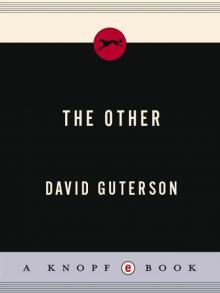 The Other
The Other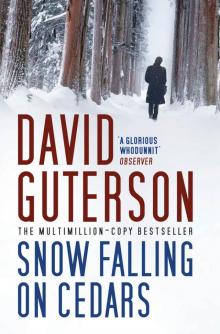 Snow Falling on Cedars
Snow Falling on Cedars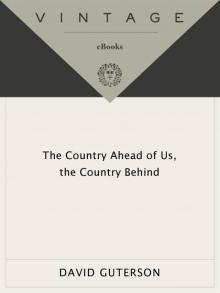 The Country Ahead of Us, the Country Behind
The Country Ahead of Us, the Country Behind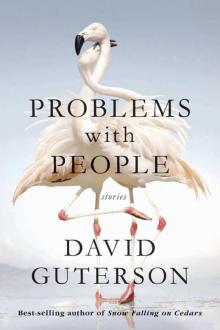 Problems With People: Stories
Problems With People: Stories East of the Mountains
East of the Mountains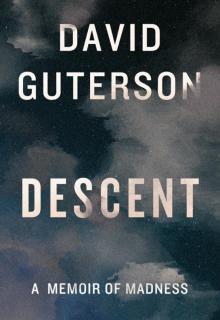 Descent: A Memoir of Madness
Descent: A Memoir of Madness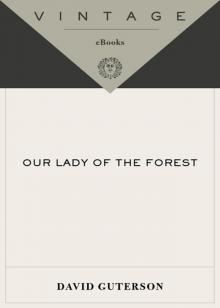 Our Lady of the Forest
Our Lady of the Forest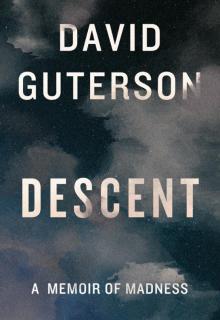 Descent
Descent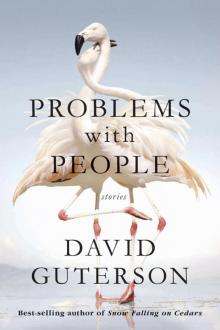 Problems with People
Problems with People